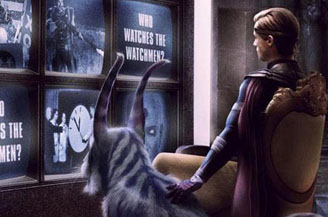Monday Morning Quarterback Part III
By BOP Staff
March 11, 2009
Reagen Sulewski: I felt that Zack Snyder knew the words but not the music. He gave us a faithful adaptation of what was on the page, but didn't go deeper than that to really give us the world of Watchmen. The alt-ness of the Watchmen's world of 1985 didn't come through on the screen for me, and many of the jumps in the structure of the film just made it a disjointed experience. I'd say that Alan Moore was proven right about what comics can do that films can't.
Really, Snyder was in a no-win scenario: he needed to divest himself from a strict textualist adaptation, but he'd have been crucified for it.
David Mumpower: I'm not dazzled by the comic book medium per se. I find it limited in some ways and undone in others by its lack of female voices. Wanted perfectly represents the voice of the genre for me, which is a pretty strong indictment. What always struck me as impressive about Watchmen the graphic novel is that Moore seemed to feel the same outrage. He went out of his way to attack all of the limitations of the genre, thereby creating a brilliant, seminal piece of archetype assassination fiction.
Zack Snyder is respectful of all the themes of the novel, with many critics asserting this was his principal fault as a director. I didn't see it that way, feeling that this was about a best case scenario result for a movie adaptation. I've always said this should have been a limited run series instead and, let's be honest, we would have gotten exactly the same cast in that scenario since none of them except maybe Crudup is too big for television. What Snyder managed to do was be true to the source material, find a better ending than the silly psychic squid thing Moore chose, and offer a relatively kick-ass comic book movie. It's a solid A for me.
Kevin Chen: Your mistake here is conflating the comic book medium with the superhero genre. Wanted is as representative of comic books as Disney is representative of animation. Stating that comic books are hampered by a lack of female voices is lack of exposure to material, not a state of the (apologies in advance) art.
David Mumpower: Fair enough. I'll restate my terms that mainstream comic books from the two industry giants, Marvel and DC, have almost no female voices. There is Gail Simone, the best writer in her craft, and then it's hard to name a second one. I think the woman from Occasional Superheroine is getting to write something at some point, but it speaks volumes that this is the closest I can come to naming a second one off my head.
Kevin Chen: I'm not really current with the state of the industry, but there were a number of female editors in both of the big houses since I started collecting, including Jeanette Kahn, Alisa Kwitney, the late Kim Yale, and Karen Berger (who presided over the Vertigo imprint and saw its success explode with Gaiman's Sandman).
Artists/inkers probably outweigh writers, but you're still looking at some prolific creators like Louise Simonson, Barbara Kesel, Devin Grayson, and Ann Nocenti. If you stop talking about Marvel and DC then you find an even wider range of creators, including Wendy Pini, Donna Barr, Lea Hernandez, Amanda Conner, Colleen Doran, Jill Thompson, and, you know, Kaja Foglio.Rats. Somebody already made the Golden God joke.Kim Hollis: Which cast member do you believe is most likely to see a career boost as a result of their appearance/performance in Watchmen?
Brandon Scott: Malin Akerman seems to be getting the most hype, but I think Patrick Wilson stands a good chance of finally getting more films from this (granted, I haven't seen the film yet). Wilson deserves more known roles regardless as he is a good and capable actor. I don't know that I can say the same about Akerman yet.
Continued:
1
2
3
4
5
|
|
|
|




